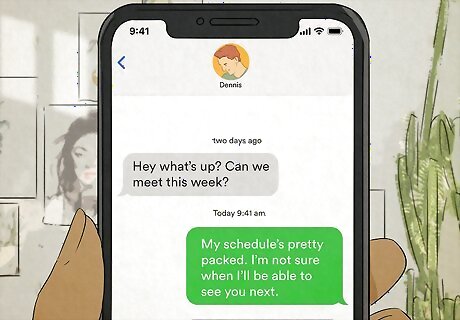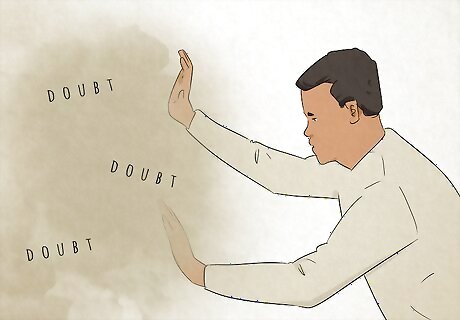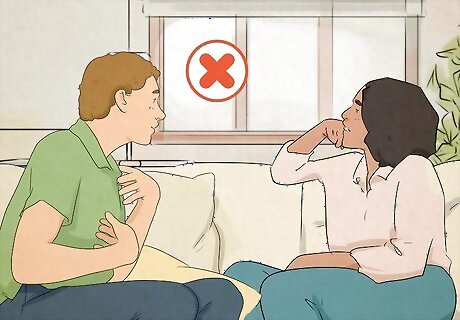
views
X
Trustworthy Source
Mayo Clinic
Educational website from one of the world's leading hospitals
Go to source
This article is based on an interview with our licensed professional clinical counselor, Jay Reid, LPCC. Check out the full interview here.
Go no contact if you can.

In cases of abuse or mistreatment, total separation is ideal. Block their phone number, block them on social media, and don’t reply to them if they try to reach out. The person may throw a fit or act out in the short term, but they’ll move on quickly once they realize you won’t engage. The other benefit of no contact is that it will give you space to heal and focus on yourself. No contact means absolutely zero contact. Do not agree to meet or chat once you’ve made your decision here. If the person is a coworker, family member, or classmate, you may not be able to do this. Alternatively, you may not want to go this far. In either case, it’s okay. We’ll cover other strategies here as well. If you are worried for your physical safety, do not hesitate to leave and get help immediately. Reader Poll: We asked 266 wikiHow readers, and 65% agreed that, in order to maintain safe boundaries with a toxic person, it's important to block their number and their social media accounts. [Take Poll]
Refuse to explain yourself.

Do not negotiate or cite evidence. Whether you’re going no contact or opting for a “softer” approach, it’s important to recognize that a toxic person just may not understand your perspective, or may not want to. Explaining your problems with them or negotiating terms is likely to be futile. If you opt to ignore them, or they confront you on why you’re acting differently, you might say, “It’s not up for discussion,” or, “I’m sorry, I’d rather not elaborate.” If you are going no contact, you can leave them a goodbye letter if you want them to know why this is happening.
Decline every opportunity to see them in person.

If you aren’t going no contact, at least refuse to meet up. Manipulative people tend to attach themselves to people who offer them validation and attention. If you can slowly detach from this person, they’ll eventually look elsewhere for what they want. Whenever there’s a chance to hang out, find something else to do. If you may run into them with mutual friends, spend the night at home. If they do poke around and ask why you’re avoiding them, you can simply play coy like you don’t really know what they’re talking about, or you can “apologize” and say you won’t do it again (but definitely do it again).
Set extremely firm boundaries.

They may eventually give up if you enforce clear boundaries. Boundaries—clear restrictions on what is and isn’t okay—are a manipulative person’s worst nightmare. If you want to keep this person around (or you can’t avoid them) but you want to curb their behavior, simply draw a line in the sand for them. For each boundary: Explain where the line is. Do not mince words when you tell them what you will no longer accept. For example, “You cannot tell me how to spend my time and money.” Describe the consequence. There must be a clear consequence or else they will keep at it. You could say, “If you don’t stop, I’m not going to talk to you about what I’m up to.” Refuse to back down. Manipulative people tend to push back on boundaries. Don’t let up. You might say, “It’s not up for negotiation. I’m not asking; I’m telling. That’s it.” Enforce the boundary. If you don’t follow through, they will simply think they can ignore your boundary. Stick to your guns!
Ignore them.

If you can’t go no contact because you have to be around them, brush them off. You can either outright pretend like they aren’t even there, or simply nod and smile when they talk before getting away as soon as possible. If they don’t get a reaction from you, they’ll eventually stop bothering you and move on to greener pastures. Whether you go totally mute or not depends on how comfortable you are with confrontation. They likely won’t respond calmly if you totally ignore them, but it should be fine so long as you’re in a safe, public setting.
Become extremely boring and distant.

If you’re not worth spending your time on, they will get tuckered out. Some people like to push your buttons to get a reaction out of you, but if you refuse to give an emotional reaction, they’ll learn to leave you alone. This is known as the “gray rock” strategy. Basically, become as interesting as a boring, old rock you’d find laying by the side of the road. Only respond in writing, if possible, don’t smile at them, keep a straight face when they tell a joke, and don’t hesitate to grunt or throw a “hmm” out there when they talk to you. The trick here is to be really muted, indescriptive, and detached. If this person isn’t getting a whole lot out of you, they’ll become frustrated and start spending their time elsewhere.
Be kind and friendly if they push you.

You’ll get zero mileage out of curt back-talk or frustration. When it comes to interacting with a manipulative person, they usually want to draw you into verbal combat. If they’re bothering you, just keep it super friendly and don’t let them get to you. By not meeting them on their level, you’ll keep them from feeling vindicated which can get them to let you be. It’s sort of like dealing with a bully. A bully will try to get you to beg, plead, or throw a punch. By responding in a friendly way, you’ll throw them off their game. For example, if they say, “I can’t believe you’re so late. You’re such a slob when it comes to keeping track of time,” you might say, “Yeah, sorry. Totally my bad!”
Drive them away with radical self-love.

If you exude self-confidence and gratitude, you’ll repel their bad vibes. Manipulative people are scavengers, and if you don’t look particularly appetizing, they’ll let you be. Focus on you. Pursue things you enjoy, put your time and energy into relationships that aren’t toxic, and continue to chase your dreams. The happier you are about being you, the less likely this person will be to bother you. This isn’t to say that you automatically feel bad about who you are if someone toxic is hovering around you. It’s not your fault that this person is being abusive.
Push back on your doubts.

If they have a habit of gaslighting, practice trusting your instincts. Gaslighting is when someone tries to trick another person into doubting their reality. If this person is showering you with criticism and negativity, you may start thinking that you’ve got a problem. You don’t. Push their critiques out of your mind and don’t let them keep you up at night. You’re doing nothing wrong by trying to remove them from your life. If you do need help parsing out whether you’ve made a mistake or not, talk to a close friend or family member whom you trust to get some feedback. If you’re tempted to go back, remind yourself why you left in the first place. You might make a list of everything they’ve done to you, or put a note up in your room to remind yourself to stay the course.
Avoid confronting them.

Calling them out will just let them play the victim card. As tempting (and emotionally rewarding) as it might be to call out a toxic person for their nonsense, it’s not a particularly good strategy when it comes to getting rid of them. People like this often thrive on conflict, and provoking them will only make you all that more interesting to them. If you suspect they could become physically aggressive, calling them out may even be a dangerous move if you push their buttons too hard.
Get professional help.

Therapy may be able to help you heal from the damage they’ve caused. Making the decision to cull a toxic or abusive person from your life can be difficult if they’re a close friend, partner, or family member. Reaching out for help can really help you make sense of this entire thing. Ending things with a narcissistic person is extremely tough, and there’s no shame in getting some support if you need it.

















Comments
0 comment